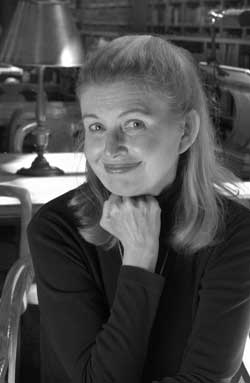 |
|
Susan Jacoby... independent scholar and reporter. Author of Freethinkers: A History of American Secularism, Ms. Jacoby’s six previous books include Wild Justice: The Evolution of Revenge which was a Pulitzer Prize finalist. Ms. Jacoby is Director of the Center For Inquiry/Metro NY and a contributor to The Washington Post, The New York Times, Newsday, Harper’s, Vogue and The New Republic |
|
 3:18 3:18 |
“We, the People...” are revolutionary words, now under attack in the very country which famously gave those words to the world. America’s Founding Fathers, many of them “Freethinkers,” deliberately created the world’s first secular nation when they began the U.S. Constitution “We, the People” and left “God” out.
Now the secular has faded from center stage with the rise of what Susan Jacoby calls the “religiously correct.” For too long, she says, secularists have allowed others to define -- and demonize -- them. She is a secularist, scholar and reporter proud of the vital role secularism has played in the American democratic experiment. So she set out to revivalize this deeply American tradition in Freethinkers: A History of American Secularism.
“‘Secularism teaches us to be good here and now. I know of nothing better than good. Secularism teaches us to be just, here and now. I know of nothing juster than just. Secularism teaches us to make the world a better place every day, to attempt to cover it with happy and contented homes,’” Ms. Jacoby says, quoting Robert Ingersoll, one of the most influential voices in the 19th century, a person now largely forgotten.
These powerful secular values are grounds for a solid morality, Ms. Jacoby says, noting they can also be the values of religious people. She is encouraged that many secular and religious people find important common ground in a here-and-now, secular approach to public affairs -- defending the deeply American idea that church and state are best kept in distinctly different realms. It is this very separation, she says, that has allowed all religions to flourish in the United States.
The Founding Fathers also intentionally erected a very high wall between religion and government, church and state, intent on keeping each out of the others’ sphere of influence, she documents. Today’s amalgamation of religion and patriotism is dangerous, Ms. Jacoby says, because it blurs the lines between church and state. It is not appropriate for the President of the United States to present himself as a minister, she says, objecting to George W. Bush standing in a pulpit essentially declaring war in September, 2001. The correct place to declare war in a secular country is before the joint Houses of Congress, says she, reciting how President-as-minister leads to dangerous wars advanced under the slogan, “God is on our side.”
The time is now to learn from America’s “freethinkers” -- those who believe in a God, those who do not and those who are agnostic -- Ms. Jacoby is certain. It’s a rich legacy stretching from revolutionary Tom Paine to W.E.B. DuBois, Ernestine Rose, William Lloyd Garrison and Abraham Lincoln, from to Elizabeth Cady Stanton, Mark Twain and Robert Ingersoll to Clarence Darrow and stalwarts throughout the 20th century. Free thought, Susan Jacoby shows, is a strong counterforce to the dangers she fears -- religion melded with political ideology and political power, betraying democracy by serving its own narrow and sectarian ends.
[This Program was recorded August 5, 2004, in New York City.]
— If you would prefer to listen to MP3 files of this program, you may do so our under-construction and related site SunOx.org. —
